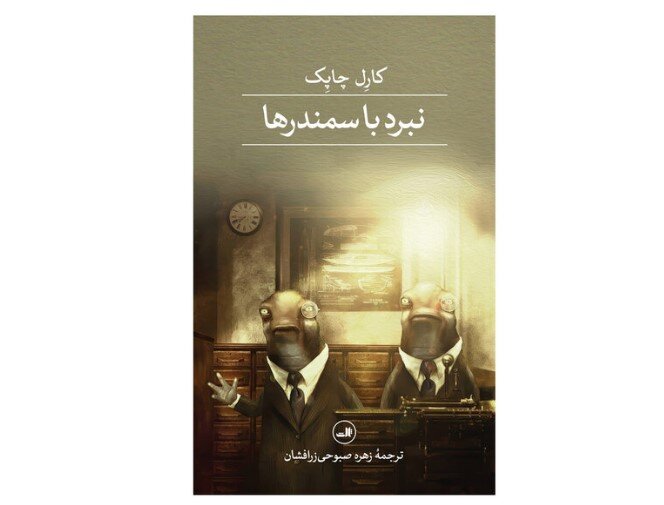“War with the Newts” at Iranian bookstores

TEHRAN- “War with the Newts” written by Czech writer and playwright Karel Čapek has recently been published in Persian.
Translated by Zohreh Sabouhi, the book has been published by Saless Publications in Tehran.
"War with the Newts" (Válka s Mloky), a 1936 satirical science fiction novel, explores the ironic consequences of human interaction with an intelligent race of sea-dwelling Newts discovered in the Indian Ocean.
The narrative unfolds, portraying the rise, exploitation, and eventual conflict between humans and Newts, culminating in a global war for supremacy.
The protagonist's role is fragmented, with the story examining societal developments rather than focusing on a single character. Key figures include Captain J. van Toch, who discovers the Newts on the island of Tanahmasa, Mr. Gussie H. Bondy, an industrialist spearheading the Newt industry, and Mr. Povondra, Bondy's doorman.
The novel's early tone is light-hearted and satirical, ridiculing human arrogance and prejudice, such as the underestimation of the Newts' capabilities and the superficial attitudes of society, particularly regarding race and scientific certainty.
As the story progresses, however, the tone darkens, reflecting the growing tensions and conflicts between humans and Newts. The Newts, initially exploited for their labor, begin to acquire human knowledge and assert their independence, leading to a series of skirmishes that eventually escalate into full-blown war.
Čapek's satire sharpens, criticizing nationalism, racial ideologies, and the failures of international diplomacy, as the world teeters on the brink of chaos.
The narrative culminates in a metafictional dialogue between the Author and the Writer, contemplating the future of both Newts and humanity. As the Newts ravage the Earth's landmass for their survival, they ironically mirror humanity's own destructive tendencies.
Ultimately, the remaining humans face a bleak existence, potentially reduced to a mere memory within a transformed world.
Through "War with the Newts," Čapek weaves a commentary on colonialism, ethical responsibility, and the cyclical nature of history, leaving readers with reflections on autonomy, exploitation, and the consequences of hubris in the face of perceived superiority.
The novel's themes and warnings remain eerily relevant today, serving as a cautionary tale about the dangers of unchecked ambition and the importance of empathy and understanding in a complex, interconnected world.
The novel's exploration of the Newts' rise to sentience and their subsequent conflict with humanity raises important questions about the nature of intelligence, consciousness, and the human condition.
Čapek's use of satire and social commentary adds depth and complexity to the narrative, inviting readers to consider the implications of human actions and the consequences of playing god with other species.
As the Newts navigate their newfound intelligence and assert their place in the world, they challenge human assumptions about superiority and dominance, forcing readers to confront the darker aspects of human nature and the destructive tendencies that threaten the planet.
Through its thought-provoking themes and timely warnings, "War with the Newts" remains a powerful and enduring work of science fiction, continues to captivate readers with its eerie relevance and profound insights into the human condition.
SAB/
